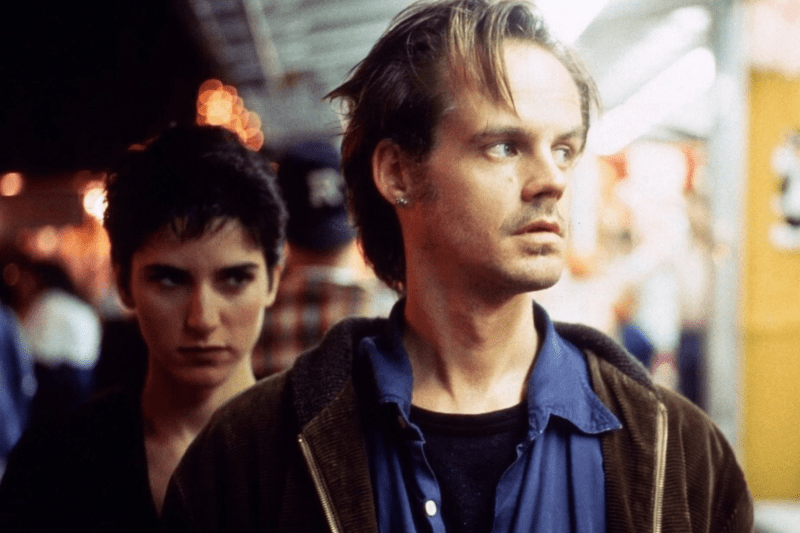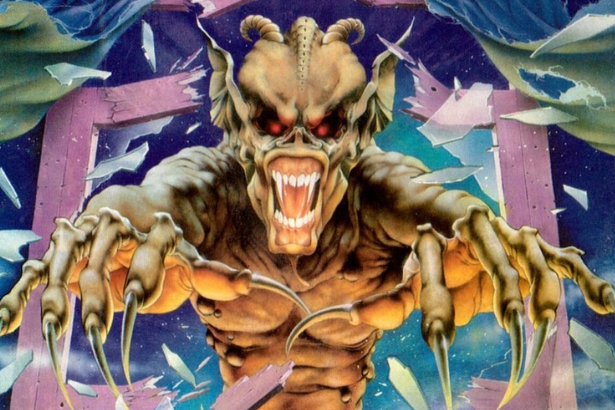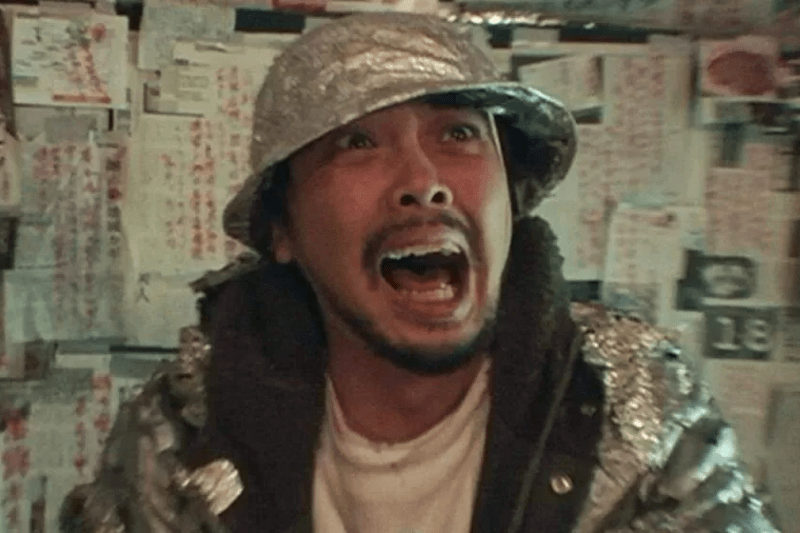At one point in Larry Fessenden's Habit, our protagonist Sam (Fessenden) is walking home with Anna (Meredith Snaider). He admits he has somewhat of a drinking problem. “I’m committing suicide on the installment plan,” he quips. To most, this is nothing but self-deprecating humor. To an alcoholic, though – like Sam, like me – we’re simply masking the truth. On top of being an excellent independent horror film, Habit is one of the finest examples of allegorically depicting addiction on screen.
The film opens with a slideshow of old pictures. Each photograph shows people smiling, having fun, and surrounded by loved ones. Right away, we know that Sam – whom we haven't met yet – is living in the past. As a proud member of a 12-step program, I have an old adage that I employ at least a dozen times daily: “One day at a time.” As the old poem goes, “There are two days with which we shouldn't concern ourselves: yesterday and tomorrow.” In Habit, we immediately realize we'll be spending the next two hours with a man who isn't living for today. Speaking from loads of personal experience, one simply cannot live like that.
When we meet Sam, he's exiting a liquor store on his way to a Halloween party. He's caught off guard momentarily when he sees a child in a devil's costume staring at him. The camera moves back and forth between the child and Sam, and on either side of them are liquor stores. After meeting Anna at the party and admitting his “problem” on their walk home, it all becomes clear. Sam is well on his way down a self-destructive path that can only have one possible outcome.
Sam and I have two very personal things in common. The first is that we're both alcoholics. The second is that we have both lost our fathers. My father passed away from ALS in 2013. In Habit, Sam's father has recently passed away. He's left with packing up his father's apartment and clearing up any other minor discrepancies. Unlike me and my father, though, Sam and his father seemed to have had a rather tumultuous relationship. After his father passed away, Sam realized he had a conscience full of resentments that he never confronted. Already grieving the loss of his remaining parent, Sam is now compounding two very difficult feelings to process. On top of losing his father, Sam's girlfriend of many years has recently left him. Grief already is a two-ton elephant that you carry on your back. Like Sam, this drove me further into the bottle.
After reconnecting, Sam and Anna begin a torrid love affair. Soon thereafter, it becomes apparent that Anna is, in fact, a vampire. She first draws blood from Sam's lip while giving him a handjob under the East Coast Memorial in Battery Park. Upon their second tryst, Sam takes Anna to his apartment. “Aren't you going to invite me in,” she asks coyly. As seasoned horror fans, we know this is vampire code. A bloodsucker can't enter the premises unless invited in.
As a stand-in for his addiction, Anna represents a choice that Sam makes. At a certain point, one's addiction – and, therefore, life – becomes unmanageable. But these are still choices we make. I remember sitting in my recliner one night, well past midnight, my family sleeping just feet away. I'd already drank six tallboys, a bottle of bourbon, and the remaining gin. The only thing left on the counter was a bottle of sweet vermouth. I could have easily given up the ghost for the evening and gone to bed. Instead, I Googled if it was acceptable to drink sweet vermouth as a libation on its own. Google said yes, so I drank an entire bottle of vermouth before stumbling to bed. Like Sam and his choice to keep seeing Anna, I made a choice that night to drink everything we had in the house.
This is where things become difficult. Before we realize it, we're miles past the line where addiction starts. But what lies ahead seems too enticing to pass up. We know we should stop, get help, call someone. But our habit, our obsession, our addiction is controlling our lives. Sam realizes the power Anna holds over him. Before long, he begins to suspect a bit of vampirism going on, although he has a hard time grasping the absurdity of it all. He can't – won't – break it off with her. Not until a catastrophe occurs. For me, my doctor told me my liver was nearly failing. I didn't stop drinking for a month after she told me that.
Many argue Habit is an allegory for STDs and AIDS. This isn't wrong at all. After inviting her in, Sam and Anna have animalistic sex on the floor of Sam's apartment. During a flickering moment of hesitation, Sam asks if Anna has protection. They proceed without the aforementioned “protection.” Afterward, during a rather beautiful scene, Sam and Anna are taking a bath together. She takes his hand and touches it between her legs. He pulls it away, revealing blood. “There's your protection,” she says.
Sam talks about how there are “other things” to worry about other than pregnancy. Moments later, Anna notices scars on Sam's arms. He reveals that he used to cut his arms at parties. This is another example of Sam killing himself “on the installment plan.” Poetically, and while lightly tracing one of his scars, Sam says, “Skin is all there is between you and the rest of the world. The blood is so eager to get out.” The addict hates themselves. We don't feel worthy of the world in which we live. We want to leave this earthly plane by whichever means possible. The funny thing is, drinking yourself to death is about as slow and arduous a way to go as possible.
The onset of the third act finds Sam and his friends Nick (Aaron Beall) and Rae (Patricia Coleman) headed to the Island for Thanksgiving. Rae asks Sam, “How's the thing with Anna turning out?” Sam stammers, “I think I got a handle on her.” On their way home from a weekend of food and plenty of drink, Sam and Nick pass a casket company truck followed by a hearse. We know where this is headed. Unless you make the choice to get out and get help, the harmless habit that surreptitiously turned into an addiction will kill you. Unfortunately, real-life death from addiction isn't nearly as romantic as the demise of the star-crossed lovers in Habit. Larry Fessenden is a master of allegory, and Habit is singular in its romanticization and swift deglamorization of alcoholism.







